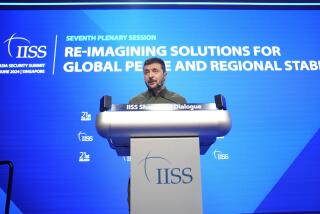China, Taiwan: No Force or Taunts
- Share via
SHANGHAI — What Wang Daohan, senior confidant of President Jiang Zemin and China’s chief negotiator with Taiwan, was trying to say, I think, was that my idea wasn’t all that original. I had proposed, in the parlor of this city’s Foreign Affairs building, a sleepy old colonial mansion, that Beijing flatly renounce the use of force against Taiwan. How terribly silly of me!
With a twinkle in his eyes, Wang replied: “Well, I will discuss your proposal with our president when I next talk to him.” We all laughed, ha-ha-ha. But the question of China’s intentions toward Taiwan is no laughing matter. Last year, China furiously flipped unarmed test missiles into the waters around Taiwan, in part because it couldn’t accept Taiwan’s president’s visit to America (ostensibly to garner an honorary degree, but really to rattle Beijing’s cage). When America dispatched aircraft carriers to the area, Beijing backed down, but it may not do so again.
To China’s leaders, Taiwan is an “internal domestic matter” (that is, nobody else’s business). In fact, in no less than three Sino-U.S. communiques (in 1972, 1979 and 1982), America signed off on the principle of Taiwan under one China. Anyone outside of China remember? Beijing emphasizes the need for peaceful reunification, but Jiang told 2,000-plus party delegates just last week: “We shall not undertake to renounce the use of force.”
Neither has Taiwan announced any intention of moderating its course. Indeed, President Lee Teng-hui was in Panama last week, showing the flag as a head of state, making everyone at the international conference uncomfortable and managing to irritate Beijing again. But the more Taiwan pushes the permanent independence envelope, the more Beijing bristles. Those bristles turn into porcupine needles or worse when Beijing, examining the controversial expansion of the U.S.-Japan security agreement, concludes that the new deal aims to throw an unprecedented Tokyo-Washington security blanket over Taiwan. “Any country in the world would be against such an approach,” said Wang.
What does China want? Last week at the party congress, Jiang reemphasized that China was retaining the military option not for possible use against Taiwan but against other powers that might intervene in what he regards as China’s domestic matter. Said Wang: “The United States should not treat the Taiwan authority as a political body or entity.” But while China may be clear in its own mind about what it is doing, it has others confused. That’s why Jiang could provide everyone, including China (not to mention little but heavily armed Taiwan), with a clarifying moment if the military option against Taiwan were pointedly ripped out of China’s playbook.
The fact is, China has no appetite for killing other Chinese. These days, China just wants to make money. Said Wang, a former mayor of Shanghai and a true survivor of history who resurfaced in 1978 after a decade of rural wastage in the Cultural Revolution: “The Chinese position that they will not give up the use of military force to solve the problem doesn’t mean that the Chinese people will conduct the military means to solve the issue.”
Of course not. The last thing China, with its 1.2 billion mouths to feed, wants is to suffocate Taiwan: It needs friends and allies on that productive and successful island of 22 million people if it is to realize peaceful unification. And its economic interests are far better served if Taiwan returns to the fold as a healthy asset, another Hong Kong. Beijing might forswear force against Taiwan as part of a deal whereby Taiwan forswears any more nationalistic game-playing. “Some people ask why China in 1996 launched a military exercise,” said Wang. “Our purpose was not to interfere with the democratic elections. The mainland will not interfere with the Taiwan people’s political life. But we’re strongly against moving toward independence. So now I’d like to reaffirm that under the one China concept, we can discuss everything.”
Let’s do just that: Taiwan can ensure its future generations a real measure of self-government and domestic independence by negotiating with Beijing, not by taunting it. And President Clinton, facing the increasingly dreary prospect of an unsatisfactory agenda-lite summit with Jiang in Washington next month, should raise the issue, delicately and respectfully. Clinton needs to understand, as indeed does Taiwan, that time is not on feisty Taiwan’s side. A China that’s patient can knock off Taiwan’s few remaining allies one by one, as it did last month when St. Lucia (a U.N. General Assembly member) switched diplomatic recognition to Beijing, slicing the number of states that recognize Taipei to 30. Slugging it out over time with an opponent much larger and just as determined is a strategy that worked only for Rocky. And that was in a Hollywood movie.
More to Read
Sign up for Essential California
The most important California stories and recommendations in your inbox every morning.
You may occasionally receive promotional content from the Los Angeles Times.










